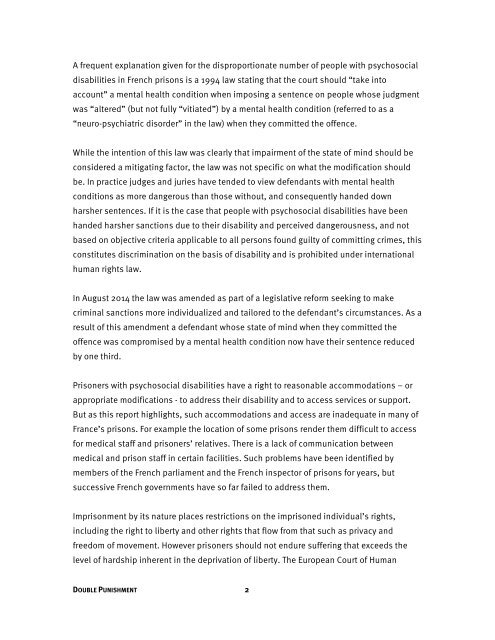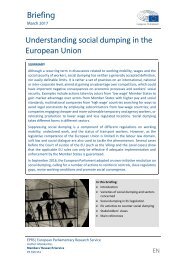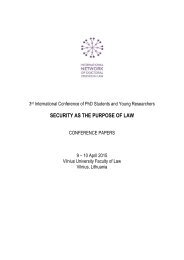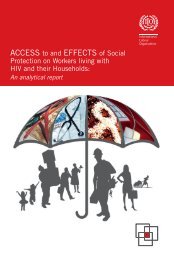DOUBLE PUNISHMENT
france0416web
france0416web
Create successful ePaper yourself
Turn your PDF publications into a flip-book with our unique Google optimized e-Paper software.
A frequent explanation given for the disproportionate number of people with psychosocial<br />
disabilities in French prisons is a 1994 law stating that the court should “take into<br />
account” a mental health condition when imposing a sentence on people whose judgment<br />
was “altered” (but not fully “vitiated”) by a mental health condition (referred to as a<br />
“neuro-psychiatric disorder” in the law) when they committed the offence.<br />
While the intention of this law was clearly that impairment of the state of mind should be<br />
considered a mitigating factor, the law was not specific on what the modification should<br />
be. In practice judges and juries have tended to view defendants with mental health<br />
conditions as more dangerous than those without, and consequently handed down<br />
harsher sentences. If it is the case that people with psychosocial disabilities have been<br />
handed harsher sanctions due to their disability and perceived dangerousness, and not<br />
based on objective criteria applicable to all persons found guilty of committing crimes, this<br />
constitutes discrimination on the basis of disability and is prohibited under international<br />
human rights law.<br />
In August 2014 the law was amended as part of a legislative reform seeking to make<br />
criminal sanctions more individualized and tailored to the defendant’s circumstances. As a<br />
result of this amendment a defendant whose state of mind when they committed the<br />
offence was compromised by a mental health condition now have their sentence reduced<br />
by one third.<br />
Prisoners with psychosocial disabilities have a right to reasonable accommodations – or<br />
appropriate modifications - to address their disability and to access services or support.<br />
But as this report highlights, such accommodations and access are inadequate in many of<br />
France’s prisons. For example the location of some prisons render them difficult to access<br />
for medical staff and prisoners’ relatives. There is a lack of communication between<br />
medical and prison staff in certain facilities. Such problems have been identified by<br />
members of the French parliament and the French inspector of prisons for years, but<br />
successive French governments have so far failed to address them.<br />
Imprisonment by its nature places restrictions on the imprisoned individual’s rights,<br />
including the right to liberty and other rights that flow from that such as privacy and<br />
freedom of movement. However prisoners should not endure suffering that exceeds the<br />
level of hardship inherent in the deprivation of liberty. The European Court of Human<br />
<strong>DOUBLE</strong> <strong>PUNISHMENT</strong> 2











